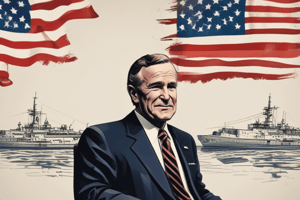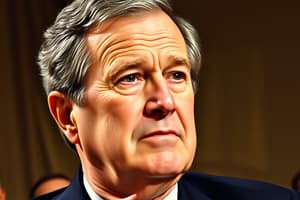Podcast
Questions and Answers
What was the main prediction made by George Orwell in his 1945 article regarding global superpowers?
What was the main prediction made by George Orwell in his 1945 article regarding global superpowers?
- The establishment of a peaceful post-war world.
- Nuclear stalemate among two or three super-states. (correct)
- An imminent invasion of Japan by the Allies.
- A unified front against communism.
What event did Stalin pledge to participate in during the Yalta Conference in February 1945?
What event did Stalin pledge to participate in during the Yalta Conference in February 1945?
- Declaration of war on Japan. (correct)
- Military invasion of Germany.
- Formation of the United Nations.
- Nuclear disarmament discussions.
What was a significant outcome of the National Security Act of 1947?
What was a significant outcome of the National Security Act of 1947?
- Establishment of the United Nations.
- Immediate military intervention in China.
- Withdrawal of military presence from Europe.
- Creation of the Central Intelligence Agency (CIA). (correct)
Which key policy document from April 1950 advocated for a massive expansion of military power to counter the USSR?
Which key policy document from April 1950 advocated for a massive expansion of military power to counter the USSR?
What was a major consequence of Mao Tse Tung's victory in the Chinese Civil War?
What was a major consequence of Mao Tse Tung's victory in the Chinese Civil War?
What was the result of the Potsdam Agreement regarding Korea in 1945?
What was the result of the Potsdam Agreement regarding Korea in 1945?
Which leader was chosen by Stalin to lead North Korea?
Which leader was chosen by Stalin to lead North Korea?
What was Kim Il Sung's political party in North Korea?
What was Kim Il Sung's political party in North Korea?
Which event marked the beginning of the Korean War?
Which event marked the beginning of the Korean War?
What action did the UN Security Council take after the invasion of South Korea?
What action did the UN Security Council take after the invasion of South Korea?
What significant increase in defense spending was indicated by NSC-68 during the Korean crisis?
What significant increase in defense spending was indicated by NSC-68 during the Korean crisis?
What was Syngman Rhee's role in South Korea?
What was Syngman Rhee's role in South Korea?
What did Truman believe would happen if Korea fell to communism?
What did Truman believe would happen if Korea fell to communism?
What was a primary reason for the establishment of Israel in 1948?
What was a primary reason for the establishment of Israel in 1948?
What was a significant consequence of the 1948 Arab-Israeli War?
What was a significant consequence of the 1948 Arab-Israeli War?
What was JFK's decision during the Bay of Pigs invasion?
What was JFK's decision during the Bay of Pigs invasion?
What was the primary outcome of the Cuban Missile Crisis in 1962?
What was the primary outcome of the Cuban Missile Crisis in 1962?
What led to increased tensions between the US and Cuba after Castro's revolution?
What led to increased tensions between the US and Cuba after Castro's revolution?
Which Arab countries invaded the region immediately after the US and USSR recognized Israel?
Which Arab countries invaded the region immediately after the US and USSR recognized Israel?
Which event solidified Castro's support among the Cuban urban poor and peasants?
Which event solidified Castro's support among the Cuban urban poor and peasants?
What was one of the consequences of the US response to Castro's land reform policies?
What was one of the consequences of the US response to Castro's land reform policies?
What was the primary reason Mao interpreted the U.S. actions in Korea as a threat to national security?
What was the primary reason Mao interpreted the U.S. actions in Korea as a threat to national security?
What was the outcome of the negotiations that began two years after the Korean conflict escalated?
What was the outcome of the negotiations that began two years after the Korean conflict escalated?
What was General MacArthur's primary criticism of President Truman’s approach to the Korean War?
What was General MacArthur's primary criticism of President Truman’s approach to the Korean War?
What marked the end of British rule in Palestine?
What marked the end of British rule in Palestine?
During which period did Mao launch a series of offensives against UN forces in Korea?
During which period did Mao launch a series of offensives against UN forces in Korea?
What was the implication of the Balfour Declaration in 1917?
What was the implication of the Balfour Declaration in 1917?
What was the immediate effect of the U.S. landing at Inchon?
What was the immediate effect of the U.S. landing at Inchon?
What was Eisenhower's primary strategy concerning communism during his presidency?
What was Eisenhower's primary strategy concerning communism during his presidency?
Flashcards
Division of Korea
Division of Korea
Korea was divided into North and South Korea following World War II, with the Soviets occupying the North and the Americans the South.
North Korean Government
North Korean Government
The Democratic People's Republic of Korea (DPRK) was established in 1948, supported by the Soviet Union under Stalin's influence.
South Korean Government
South Korean Government
Syngman Rhee led the Republic of Korea established in 1948, supported by the United States and anti-communist elements.
Korean War
Korean War
Signup and view all the flashcards
UN Intervention
UN Intervention
Signup and view all the flashcards
NSC-68
NSC-68
Signup and view all the flashcards
Truman Doctrine
Truman Doctrine
Signup and view all the flashcards
Cold War Symbol
Cold War Symbol
Signup and view all the flashcards
Creation of Israel
Creation of Israel
Signup and view all the flashcards
Arab-Israeli War of 1948
Arab-Israeli War of 1948
Signup and view all the flashcards
Cuban Revolution
Cuban Revolution
Signup and view all the flashcards
Bay of Pigs Invasion
Bay of Pigs Invasion
Signup and view all the flashcards
Cuban Missile Crisis
Cuban Missile Crisis
Signup and view all the flashcards
US economic domination (Latin America)
US economic domination (Latin America)
Signup and view all the flashcards
JFK and the Bay of Pigs
JFK and the Bay of Pigs
Signup and view all the flashcards
Soviet Missile Deployment (Cuba)
Soviet Missile Deployment (Cuba)
Signup and view all the flashcards
Inchon Landing
Inchon Landing
Signup and view all the flashcards
China's Intervention
China's Intervention
Signup and view all the flashcards
Korean War Escalation
Korean War Escalation
Signup and view all the flashcards
MacArthur's Dismissal
MacArthur's Dismissal
Signup and view all the flashcards
Korean Armistice
Korean Armistice
Signup and view all the flashcards
Cold War Containment
Cold War Containment
Signup and view all the flashcards
Balfour Declaration
Balfour Declaration
Signup and view all the flashcards
Post-War Division
Post-War Division
Signup and view all the flashcards
Study Notes
Cold War Overview
- George Orwell, a British writer, predicted a nuclear stalemate between 2 or 3 super-powers during 1945.
- Super-powers possessed weapons with the power to wipe out millions within seconds.
- The Yalta Conference (February 1945) highlighted the need for Soviet involvement in ending WWII.
- Stalin pledged to declare war on Japan, which happened on August 8, 1945. Allies needed Soviet Union's cooperation.
National Security Act of 1947
- The act was a response to perceived threats from the USSR after WWII
- It established the Department of Defense (incorporating the army, navy, and air force).
- It created the Central Intelligence Agency (CIA) and the National Security Council (NSC).
- The NSC advised the president on security matters.
- The Act set a framework for foreign policy for the next 40+ years
China's Civil War & US Involvement
- Fears of Communism in China led the US to aid Chiang Kai-shek's (Chiang Kai Chek) government, despite its unpopularity.
- Mao Zedong's (Mao Tse Tung) Communists were gaining support, particularly in rural areas, eventually gaining control of the country.
- On October 1, 1949, the People's Republic of China (PRC) was established.
- Chiang and his nationalists fled to Taiwan.
- The US refused military intervention in China's civil war.
Korean War (1950-1953)
- Korea was a colony of Japan until the end of WWII.
- Post-war, temporary occupation of Korea was agreed upon at the Potsdam Conference (1945) to remove Japanese control.
- US administered South Korea; USSR administered North Korea.
- In June 1950, North Korea invaded South Korea.
- The UN Security Council condemned the invasion and authorized military intervention.
- The US, with other UN forces, intervened to defend South Korea.
- The Korean War resulted in high civilian casualties that exceeded those of WWII and Vietnam.
- The Korean War ended in July 1953 with the two Koreas remaining divided.
- Mao Zedong (Mao Tse Tung) felt US commitment would halt expansion – he sent Chinese troops.
The Bay of Pigs Invasion
- The 1,200-man counter-revolutionary force was part of a CIA-led mission to overthrow Fidel Castro.
- The exiles landed in Cuba in April 1961 and were quickly defeated by Castro's forces, embarrassing the United States.
Cuban Missile Crisis
- The USSR provided Cuba with weapons.
- This led to the discovery of missile sites in Cuba by US intelligence.
- Kennedy, through US military, demanded removal of these missiles.
- Naval blockade of Cuba, and emergency UN meeting
- Eventually, under pressure, the USSR agreed to withdraw missiles and bombers.
- An agreement was reached, preventing a global nuclear conflict
Post-Crisis Aftermath
- The establishment of a direct phone line between the US and the USSR (the hot line) led to peaceful coexistence (avoiding nuclear war).
- Limited Nuclear Test Ban Treaty (August 1963), prohibiting testing nuclear weapons by US, USSR & UK
McCarthyism and the Red Scare
- Joe McCarthy, a US senator, led the anti-communist movement.
- McCarthy's efforts resulted in the dismissal of employees and the censure of elected officials, resulting in loss of support.
Collapse of the USSR
- The fall of the USSR happened in 1991.
- This led to many Russian immigrants leaving Central Asia.
The Arab-Israeli War of 1948
- Arab states refused to recognize Israel's right to exist.
- Following the declaration, 5 Arab states invaded Israel.
- This conflict complicated US policy in the Middle East.
- More than 700,000 Palestinians fled their homes.
Cuba: The Rise of Fidel Castro
- Fidel Castro led a peasant-based revolution that overthrew Fulgencio Batista in 1959.
- Cuba became increasingly anti-American in the years following.
US Economic Dominance
- The US gained economic influence, especially in Latin America and other regions, beginning with the Spanish-American War.
Studying That Suits You
Use AI to generate personalized quizzes and flashcards to suit your learning preferences.




